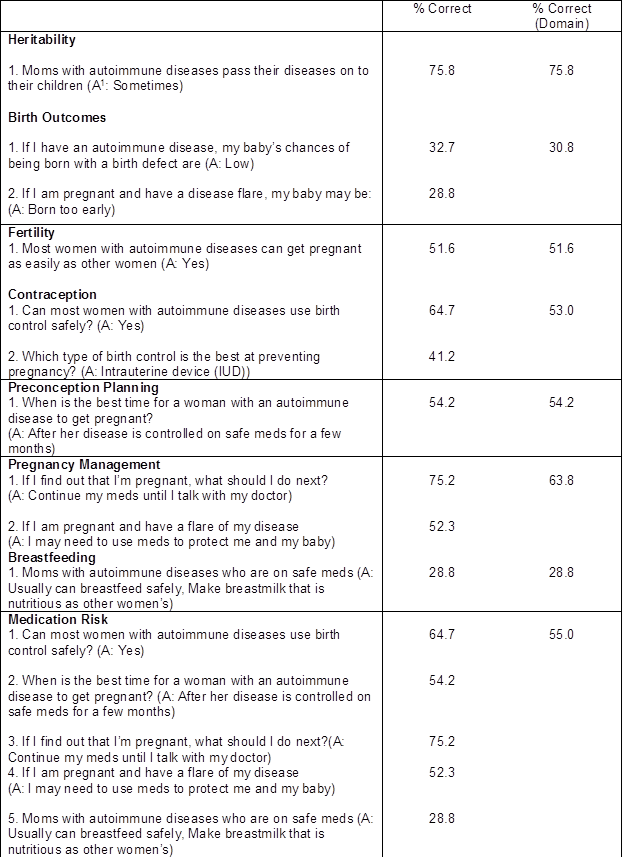Session Information
Session Type: ACR Poster Session C
Session Time: 9:00AM-11:00AM
Background/Purpose: While women with rheumatic diseases may face considerable reproductive health challenges, few studies have objectively assessed what these women know about their reproductive risks. This study evaluates patients’ knowledge across a range of topical domains, including heritability, preconception health, contraception, fertility, pregnancy management, medication risk, and lactation.
Methods: With input from rheumatologists, women’s health experts, a pharmacist, and survey methodologist, we created a 10-item test to evaluate patients’ knowledge (ReproKnow). Women aged 18-50 years old were recruited to take ReproKnow and a demographic survey immediately after their physician visit at a participating rheumatology clinic. Descriptive statistics were used to summarize sample characteristics. Each question was scored as correct (1) or incorrect (0). Independent sample t-tests were used to evaluate the associations between total knowledge score and age, race, education, family characteristics, and clinical factors. Questions were grouped into domains based on their conceptual relationships, and mean percentages of correct answers were calculated within these domains.
Results: Our sample included 153 women who were 38.3 years old on average (S.D. 8.2) and predominately white (77%). Half (50%) had attained at least a secondary level of education. Patients’ mean total knowledge scores were 5.0 (SD 2.2), with a median of 5.0 (range 0-10). Women who were younger, white, had higher education levels, or had experienced pregnancies after rheumatic disease diagnosis, had higher total knowledge scores (p<0.05).
When assessed by reproductive health topics, women were least likely to correctly answer questions about the safety of breastfeeding (28.8% correct) or the frequency of birth defects among children born to mothers with rheumatic diseases (30.8% correct). Approximately 50% of women correctly answered questions about fertility, contraception safety and efficacy, preconception planning, and medication risk.
Conclusion: Our study suggests that some women with rheumatic diseases have significant knowledge gaps about aspects of their reproductive health. Future work is needed to assess how knowledge may influence informed reproductive decision-making, behaviors, and outcomes in this high-risk group of women.
Table 1. Percentage of Correct Answers By Question and By Concept Area (Mean Percentage, %))
1 A = Correct Answer
To cite this abstract in AMA style:
Birru Talabi M, Clowse MEB, Blalock SJ, Yu L, Chodoff A, Borrero S. Evaluating Gaps in Reproductive Health Knowledge Among Women with Rheumatic Diseases [abstract]. Arthritis Rheumatol. 2018; 70 (suppl 9). https://acrabstracts.org/abstract/evaluating-gaps-in-reproductive-health-knowledge-among-women-with-rheumatic-diseases/. Accessed .« Back to 2018 ACR/ARHP Annual Meeting
ACR Meeting Abstracts - https://acrabstracts.org/abstract/evaluating-gaps-in-reproductive-health-knowledge-among-women-with-rheumatic-diseases/

